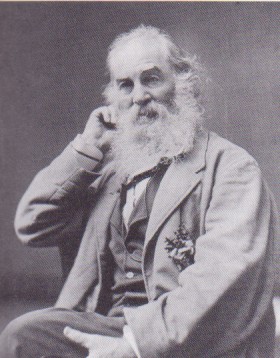|
● Early
Fiction
● Transcendentalists
● Power
of Imagination
● New
Visions of America
● Reform
and Liberation
● Regionalism
● A
New Wave
● Sympathetic
Views
● Rebellious Spirit
● The
Modernists
● The Lost Generation
● Harlem Renaissance
● New
Drama
● Depression,
Realism and Escapism
● Postwar Voices
and the "Beat Generation"
● New American
Voices
New Visions of America
 |
| Walt
Whitman |
 Poe,
Hawthorne and Melville all struggled to find their individual voices,
and through them American literature began to acquire
its own personality. One more figure emerged in the 1850s to assert
a truly American voice, one that celebrated
the American landscape, the American people, their speech and democratic
form of government. His name was Walt
Whitman (1818-1892), and like so many others of these writers,
he had had to work hard for a living as a school teacher, printer
and journalist. In 1848, he took a trip to the southern city of
New Orleans, at the mouth of the Mississippi River, that great waterway
flowing through the heart of the country. There Whitman gained a
new vision
of America and began writing poetry that would embody
his vision. In 1855, he published a ground—breaking
book called Leaves of Grass. Readers were amazed by the free—flowing
structure of this poetry, with its long irregular lines. Like
Melville in Moby Dick, Whitman ventured
beyond traditional forms to meet his need for more space to express
the American spirit. Some readers were disturbed by Whitman's
egotism
(one main poem in Leaves of Grass is called "Song of
Myself"), but Whitman dwelt on himself simply because he saw
himself as a prototype
of "The American." Startling
as this poetry was, it won Whitman admirers across America
and in Europe. Throughout the rest of his life, he kept rewriting
and republishing editions of Leaves of Grass. He
celebrated a sweeping panorama of the American landscape and sang
almost mystically of the rhythms of life uniting all citizens of
the democracy. Poe,
Hawthorne and Melville all struggled to find their individual voices,
and through them American literature began to acquire
its own personality. One more figure emerged in the 1850s to assert
a truly American voice, one that celebrated
the American landscape, the American people, their speech and democratic
form of government. His name was Walt
Whitman (1818-1892), and like so many others of these writers,
he had had to work hard for a living as a school teacher, printer
and journalist. In 1848, he took a trip to the southern city of
New Orleans, at the mouth of the Mississippi River, that great waterway
flowing through the heart of the country. There Whitman gained a
new vision
of America and began writing poetry that would embody
his vision. In 1855, he published a ground—breaking
book called Leaves of Grass. Readers were amazed by the free—flowing
structure of this poetry, with its long irregular lines. Like
Melville in Moby Dick, Whitman ventured
beyond traditional forms to meet his need for more space to express
the American spirit. Some readers were disturbed by Whitman's
egotism
(one main poem in Leaves of Grass is called "Song of
Myself"), but Whitman dwelt on himself simply because he saw
himself as a prototype
of "The American." Startling
as this poetry was, it won Whitman admirers across America
and in Europe. Throughout the rest of his life, he kept rewriting
and republishing editions of Leaves of Grass. He
celebrated a sweeping panorama of the American landscape and sang
almost mystically of the rhythms of life uniting all citizens of
the democracy.
Previous Page Next
Page
|

